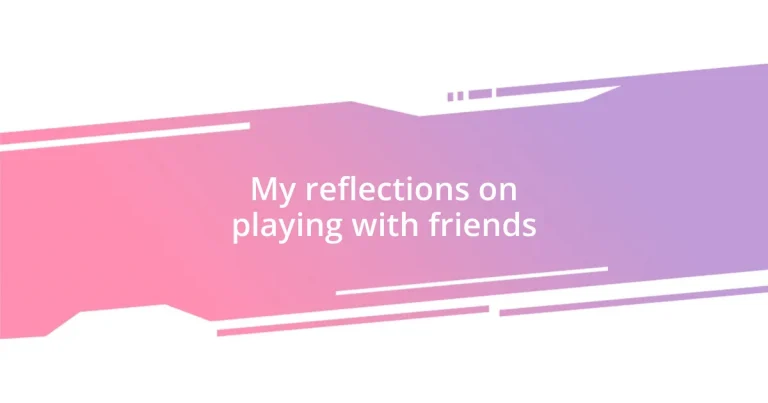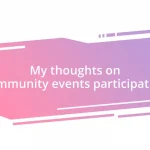Key takeaways:
- Friendship enhances shared experiences, providing emotional support and teaching valuable life skills like teamwork and empathy.
- Playing together boosts mental well-being, improves communication skills, and fosters deeper connections among friends.
- Open communication and conflict resolution strategies during games strengthen relationships, leading to personal growth and memorable experiences.
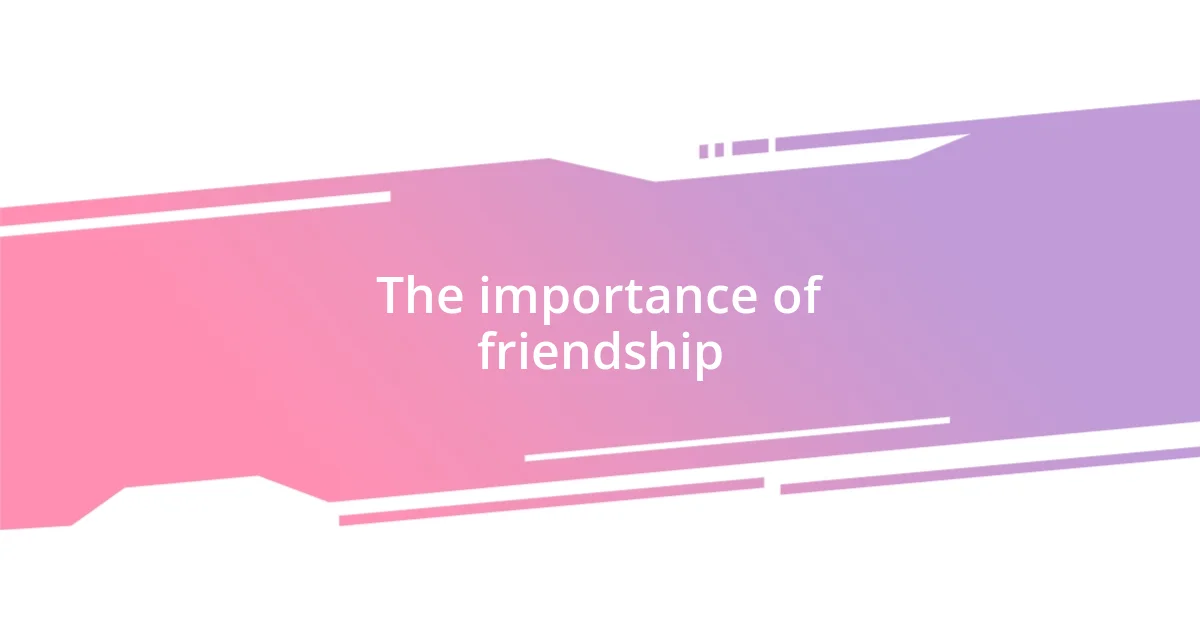
The importance of friendship
Friendship is like the glue that holds our social lives together. Think about a time you were playing a game with friends, the laughter ringing through the room. It’s those shared moments that build connections and create lasting memories. I remember once losing a board game and instead of sulking, my friends rallied around me, turning a loss into a fun and humorous experience. Isn’t it amazing how friends can transform a simple activity into something so much more meaningful?
Moreover, friendships provide support during both highs and lows. I think back to a tough time in my life when just sitting with friends and talking felt like a weight lifting off my shoulders. They didn’t have to offer solutions; their presence was enough. This emotional safety net is invaluable, don’t you think?
In playing with friends, we learn important life skills, like teamwork and empathy. I often marveled at how competitive sports taught me to respect others even when I desperately wanted to win. Did you ever notice how a little friendly competition brings out not just the best but also the most genuine sides of ourselves? Those moments reveal the importance of camaraderie—and the joy of simply being together.
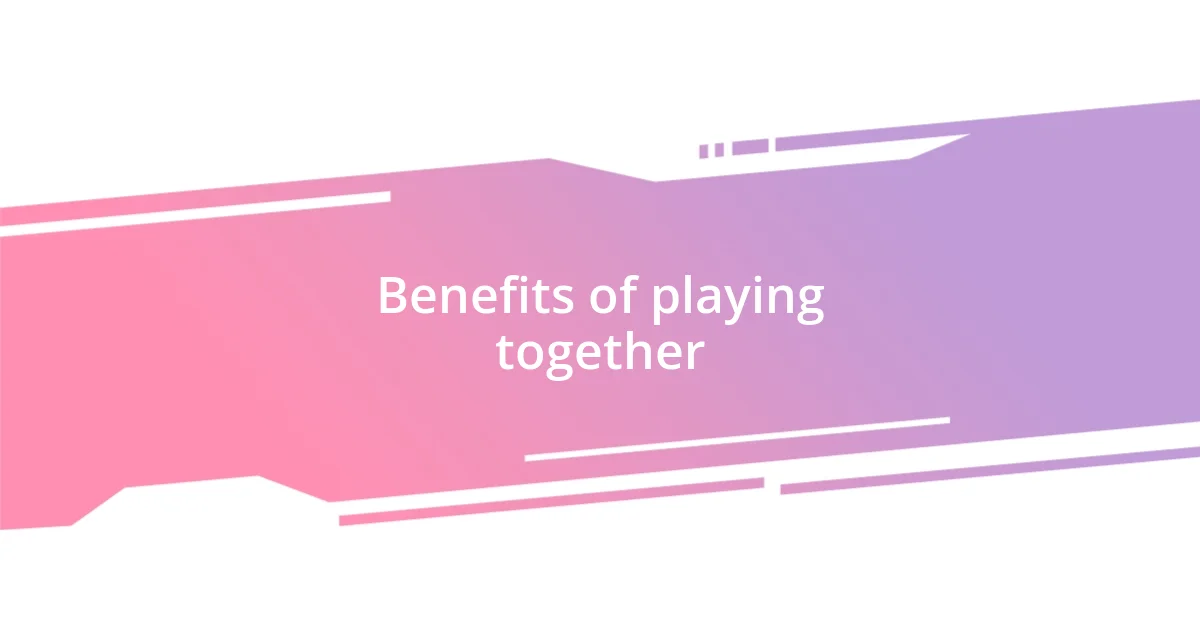
Benefits of playing together
Playing together offers a treasure trove of benefits that enrich our lives. For instance, the joy of collaboration is something I cherish. When I played cooperative video games with friends, I remember strategizing together, each of us contributing unique ideas. This not only strengthened our problem-solving skills but also forged deeper bonds—I could feel the excitement in the air as we celebrated our victories together.
Another remarkable benefit is the boost in mental well-being. Engaging in fun activities with friends has always served as my escape from stress. I recall one weekend gathering where we organized a mini sports competition. The thrill of playing, combined with the laughter and friendly banter, lifted my spirits immensely. It’s incredible how such moments can replace worries with joy, don’t you think?
Moreover, shared playtime enhances communication skills. As we come together for many game nights, I noticed how our conversations flowed more freely, creating a space where everyone felt heard. Reflecting on those experiences, I realize that the ability to express thoughts and feelings improves not just during games, but also in our everyday interactions.
| Benefit | Personal Experience |
|---|---|
| Collaboration | Strategizing during cooperative video games deepened friendships and problem-solving skills. |
| Mental Well-being | Sports competitions transformed stress into joy and laughter. |
| Communication Skills | Game nights fostered open conversations, enhancing both in-game and real-life communication. |
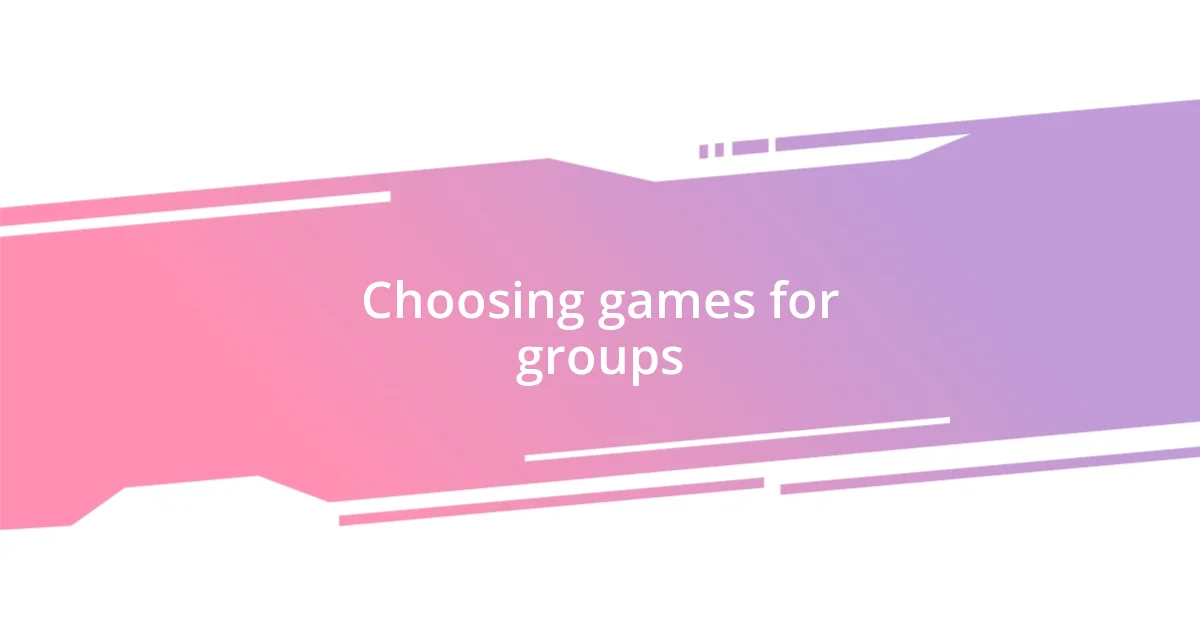
Choosing games for groups
Choosing the right games for a group can be a creative challenge, and I believe it’s essential to consider the group’s interests and dynamics. I remember one time organizing a game night at my place. I initially selected a fast-paced trivia game, thinking it would be a hit. Yet, I quickly realized that my friends preferred more relaxed gameplay. Adjusting the plan made all the difference, creating an atmosphere where everyone felt comfortable and engaged.
When selecting games, keep these points in mind:
- Group Size: Some games excel with larger teams, while others are better for intimate gatherings. Adjusting based on the number of players can greatly enhance enjoyment.
- Game Duration: Pay attention to how much time you have. A quick party game can be perfect if you’re short on time, whereas a long strategic game may suit an evening with friends.
- Skill Levels: Choose games that suit your group’s varied skill levels, ensuring both beginners and experts can participate happily. This way, no one feels overwhelmed or outpaced.
- Interests: Gauge what types of games excite your friends—be it strategy, trivia, or creative challenges. Aligning with their preferences will make the evening more enjoyable for everyone.
Finding that perfect game that resonates with your friends often leads to those spontaneous moments of laughter and connection that make the gathering truly unforgettable.
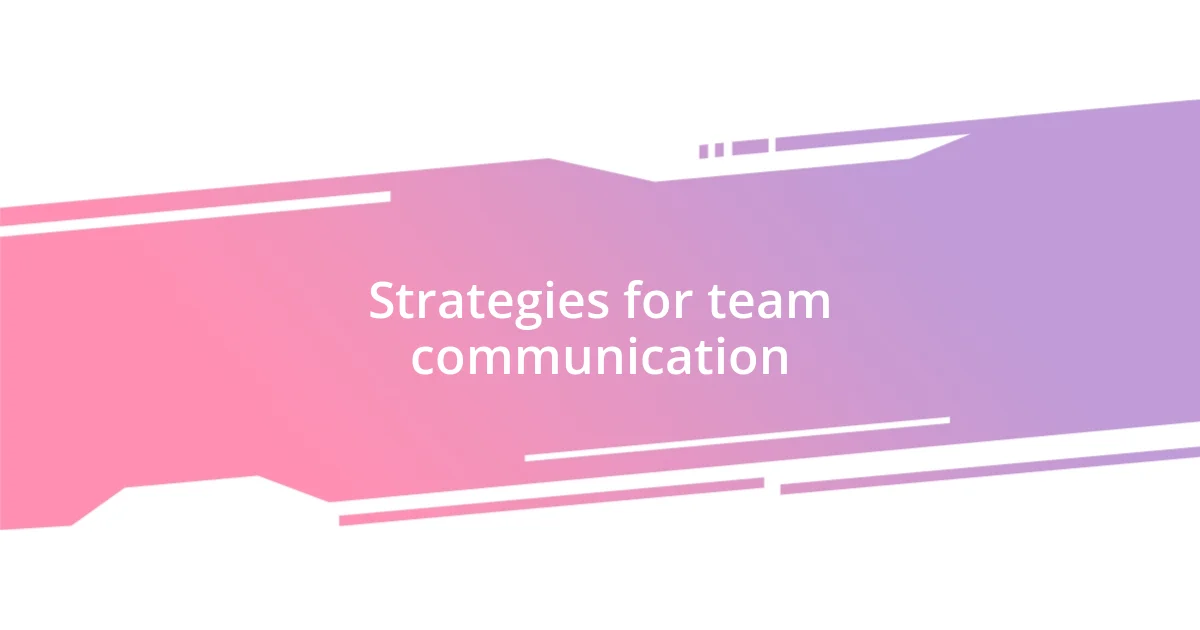
Strategies for team communication
When it comes to team communication, clarity is paramount. I’ve experienced firsthand how vital it is to establish a common language and set expectations among team members. During one particularly engaging board game night, I noticed that discussing our strategies openly not only enhanced our gameplay but also fostered a sense of unity. It felt great when we all agreed on roles and tactics; it was like we were speaking a shared language, and it made our victories all the more rewarding.
Another effective strategy I find useful is leveraging technology for real-time communication. I’ve often used messaging apps to coordinate during games, especially when we’re in different rooms or even online. I vividly remember a gaming session where we employed voice chat, and it transformed our teamwork. Suddenly, we were all on the same page, effectively coordinating attacks and defenses without missing a beat. How many times have you seen a team succeed because they could communicate instantly? It’s a game-changer.
Lastly, creating a safe space for open feedback is crucial. I recall a night where a friend pointed out a strategy flaw I had overlooked, and instead of feeling defensive, I welcomed it. This open dialogue allowed us to learn and improve together, turning potential frustrations into growth moments. Encouraging this environment not only enhances our games but strengthens our friendships. Isn’t it amazing how constructive communication can elevate not just our gameplay, but how we relate to each other?
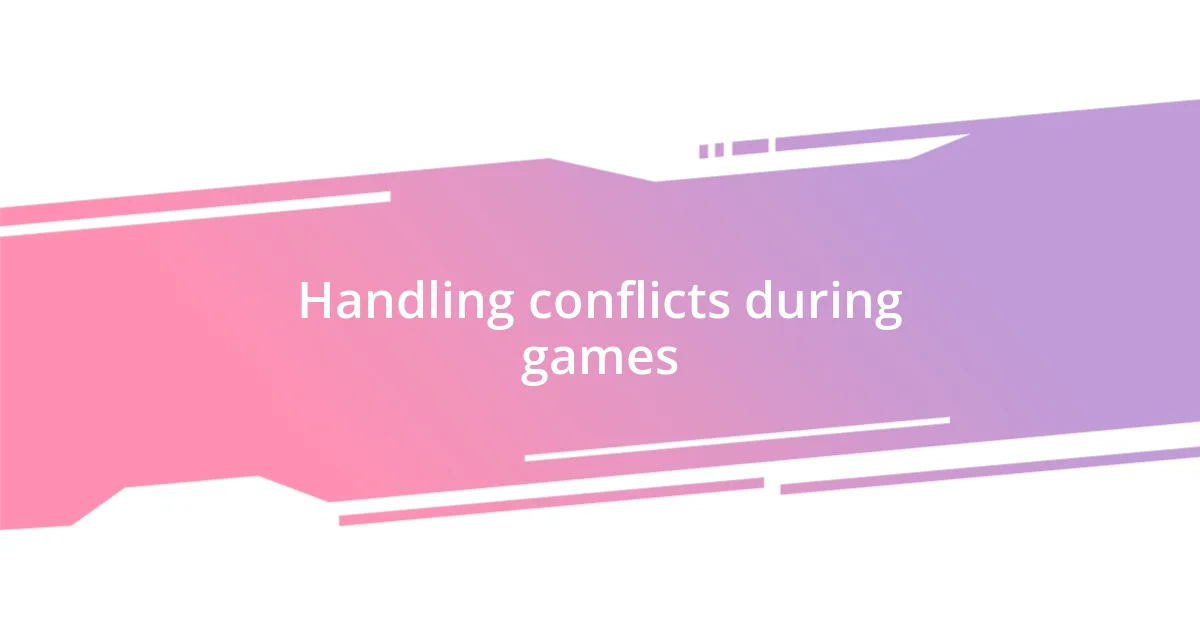
Handling conflicts during games
Conflicts in games are inevitable, and I’ve seen how they can quickly escalate if not handled with care. During one game night, a misunderstanding over the rules led to a heated argument between two friends. Instead of letting it fester, I suggested a quick pause to discuss the rules calmly. This approach not only diffused the tension but also reminded everyone why we were there—to have fun together.
I often find that addressing conflicts openly and promptly helps clear the air. Once, while playing a competitive card game, one player felt they were unfairly targeted. I gathered everyone for a quick chat, allowing the player to voice their concerns. Listening to each other turned a potential ongoing issue into an opportunity for empathy and understanding. It was remarkable to see how acknowledging feelings changed the dynamics, making the game enjoyable for all.
Finding common ground during disagreements can also be a powerful tool. I remember a situation where two teammates clashed over a strategy during a cooperative game. Rather than taking sides, I facilitated a discussion where both perspectives were shared. By the end, they not only reached a compromise but also developed a stronger bond. Isn’t it fascinating how navigating conflicts can ultimately deepen friendships and enhance teamwork?

Creating memorable experiences
Creating memorable experiences with friends is all about the moments that make you smile for years to come. I remember one summer evening when we gathered for a backyard barbecue and decided to play an impromptu game of charades. The laughter that erupted as we attempted to act out ridiculous phrases became the highlight of the night. Those shared, silly moments forged deeper connections, reminding me that sometimes it’s the simplest activities that create lasting memories.
I’ve also found that incorporating small surprises can elevate your game nights from ordinary to extraordinary. One time, I surprised my friends with personalized scorecards and fun prizes for the winner. The excitement in the air was palpable, and I could see my friends lighting up with anticipation. A little creativity goes a long way—wouldn’t you agree that these unexpected touches transform the experience into something truly special?
What strikes me most about these experiences is the way they intertwine joy and camaraderie. I still cherish the time we stayed up late playing video games, sharing snacks, and recounting our funniest childhood memories. Those late-night conversations, filled with laughter and personal stories, strengthened our bonds. Reflecting on these moments, isn’t it curious how the best memories often spring from simplicity and shared joy?

Reflecting on personal growth
Reflecting on personal growth through playing games with friends has been an eye-opening journey for me. I recall a time when I was overly competitive, wanting to win at all costs. During a board game night, I noticed that my fierce attitude was pushing my friends away. Realizing this, I took a step back, embraced a more relaxed approach, and found myself enjoying the game just as much as they were. Isn’t it amazing how stepping outside of our usual patterns can lead to discovering joy in the process rather than the outcome?
As I think about those gaming nights, I can’t help but appreciate how they’ve shaped my patience and empathy. There was that memorable session of cooperative gameplay where our team faced tough challenges. Instead of pointing fingers when someone made a mistake, I focused on encouraging constructive discussion. This not only strengthened our team’s performance but also reinforced my belief in the power of collaboration. Have you ever experienced a moment where embracing teamwork helped you grow in unexpected ways?
What truly stands out in my reflections is how these experiences have fostered lasting friendships. I remember one friend who was shy and often reluctant to join our game nights. By inviting her into the mix and recognizing her contributions during our games, she blossomed into a confident participant. Watching her evolve was gratifying and made me realize how gaming can serve as a wonderful platform for personal growth—not just for ourselves but for those around us as well. It makes me wonder, how often do we miss opportunities to uplift others in our everyday interactions?












